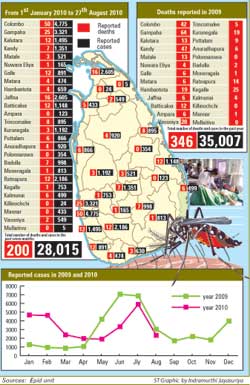The public could be doing a lot more to help eradicate dengue and eliminate mosquito-breeding sites, according to health officials. Colombo is a veritable breeding ground for the dengue mosquito, with public housing schemes and leading schools found to be especially negligent about keeping their premises clean.
Last year, some 4,810 Colombo residents were hit by dengue. So far this year, up to August, there have been 4,671 cases, an increase of 41 per cent over the same period last year. Colombo Municipal Council (CMC) health officials fear an increase with the rains expected in October.
"Mosquito density will increase … and the number of dengue cases will go up again. We have launched numerous clean-up campaigns, but our efforts won't amount to much without the support of the public." |
| Dr. Pradeep Kariyawasam,
Colombo Municipal Council chief medical officer |
Densely populated urban areas are the most vulnerable. Colombo is the worst affected, although significant measures have been taken to control dengue in the city.
August saw 567 dengue cases in Colombo, a decrease, compared to the 1,429 cases in July. However, even 567 cases is still too high a figure, says Dr. Pradeep Kariyawasam, chief medical officer at the CMC.
"Mosquito density will increase in mid-October, and the number of dengue cases will go up again," he said. "We have launched numerous clean-up campaigns, but our efforts won't amount to much without the support of the public."
A number of housing schemes and the premises of leading schools in and around Colombo have been identified as "mosquito-friendly". The Muna-singhapura and Maligawatta housing schemes are especially vulnerable.
"Many dengue cases have been reported from these housing schemes, while students living in the hostels of certain schools have contracted dengue," he said. Some 20 students accommodated in the hostel of a leading Colombo school were hit by dengue this year; stagnant water in the school basement was identified as the mosquito-breeding site.
Dr. Kariyawasam said Colombo schools were not doing enough to control the problem. The schools depend on fogging to keep the premises mosquito-free, while failing to initiate cleaning-up campaigns.
The arrival of teams of Army and Police personnel to help clean up neighbourhoods has made a difference, Dr. Kariyawasam said. "The public is taking a more active role in this matter after the armed forces joined in the dengue battle. Many think it is the government's duty to ensure they are safe from the mosquito, quite forgetting that they too have a role to play."
The dengue mosquito needs no more than a teaspoon of water to breed. The mosquito's flying range of 150 yards means that residents, however vigilant they may be on their own premises, are not safe as long as the neighbourhood continues to harbour breeding sites.
Last year's North-East monsoon triggered the highest number of dengue cases, and the same could happen this year unless preventive measures are taken by both the authorities and the public, Dr. Kariyawasam said.
Health officials expect a significant increase in dengue cases with the onset of the North East monsoon in October. Although the number of dengue cases reported in August shows a drop by 50 per cent over the previous months, the authorities expect the monsoon rains to set off another wave of dengue.
Dr. Nimalka Pannilahetti is the co-ordinator for the National Dengue Control Unit of the Ministry of Health. She told the Sunday Times that the overall drop in the number of cases in August was accompanied by an increase in certain areas of the country, compared with last year.
"The situation is much worse this year in districts like Colombo, Ratnapura and Badulla," she said. "Meanwhile, there has been a significant improvement in Kandy, Kegalle and Kurunegala."
Dr. Pannilahetti said residential areas around the country continued to be prime breeding grounds for the dengue mosquito.
Residents should ensure that their homes, gardens and neighbourhood are free of mosquito-breeding spots, such as birdbaths, ornamental pools, drains, gutters, and discarded coconut shells, plastic containers and plastic bags. |


